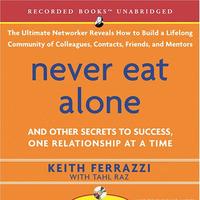13. CHAPTER 3 What's Your Mission?
CHAPTER 3 What's Your Mission?
"Would you tell me, please, which way I ought to go from here?
"That depends a good deal on where you want to get to," said the Cat.
"I don't much care where—" said Alice.
"Then it doesn't matter which way you go," said the Cat.
—Alice's Adventures in Wonderland BY LEWIS CARROLL
Do you want to become a CEO or a senator?
Rise to the top of your profession or to the top of your child's school board? Make more money or more friends? The more specific you are about what you want to do, the easier it becomes to develop a strategy to accomplish it.
Part of that strategy, of course, is establishing relationships with the people in your universe who can help you get where you're going. Every successful person I've met shared, in varying degrees, a zeal for goal setting.
Successful athletes, CEOs, charismatic leaders, rainmaking salespeople, and accomplished managers all know what they want in life, and they go after it. As my dad used to say, no one becomes an astronaut by accident.
Luck has little to do with achievement, as a study cited in Success magazine makes clear. In the study, researchers asked Yale's class of 1953 a number of questions. Three had to do with goals: Have you set goals?
Have you written them down?
Do you have a plan to accomplish them?
It turned out that only 3 percent of the Yale class had written down their goals, with a plan of action to achieve them.
Thirteen percent had goals but had not written them down. Fully 84 percent had no specific goals at all, other than to "enjoy themselves. In 1973, when the same class was resurveyed, the differences between the goal setters and everyone else were stunning.
The 13 percent who had goals that were not in writing were earning, on average, twice as much as the 84 percent of students who had no goals at all. But most surprising of all, the 3 percent who had written their goals down were earning, on average, ten times as much as the other 97 percent of graduates combined! My own focus on goal setting started early.
As a Yale undergrad, I thought I wanted to become a politician, a future governor of Pennsylvania. (I really was that specific, and that naive.) But I learned that the more concrete my goal, the more I could accomplish toward it. In my sophomore year, I became chairman of Yale's political union, where so many alumni had cut their teeth before going on to careers in politics.

